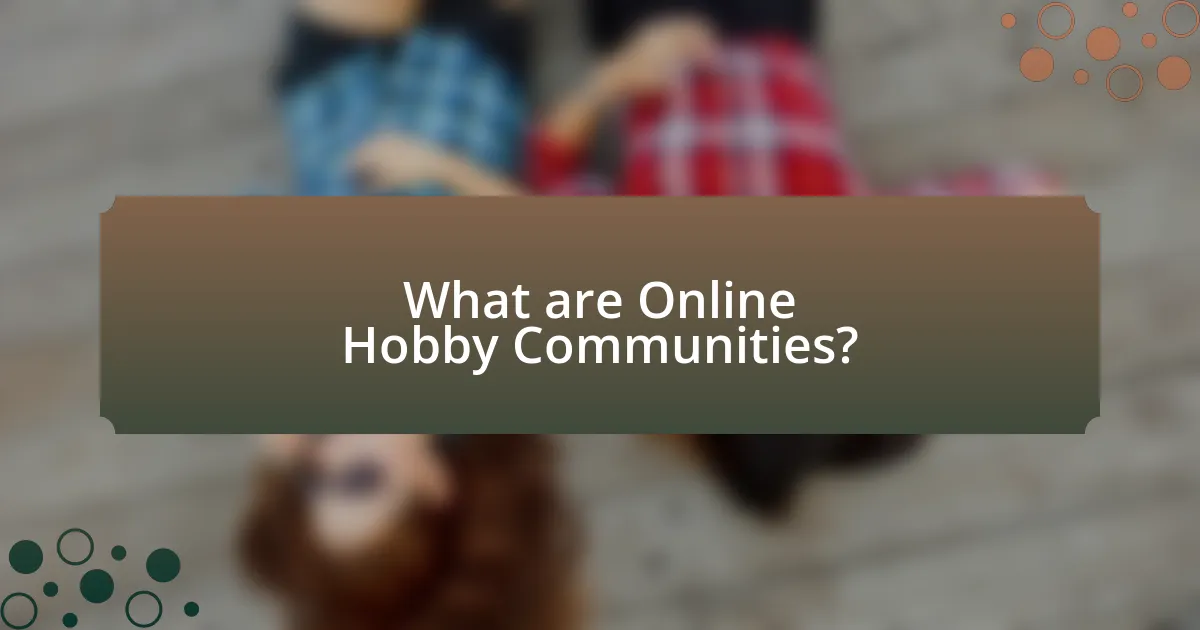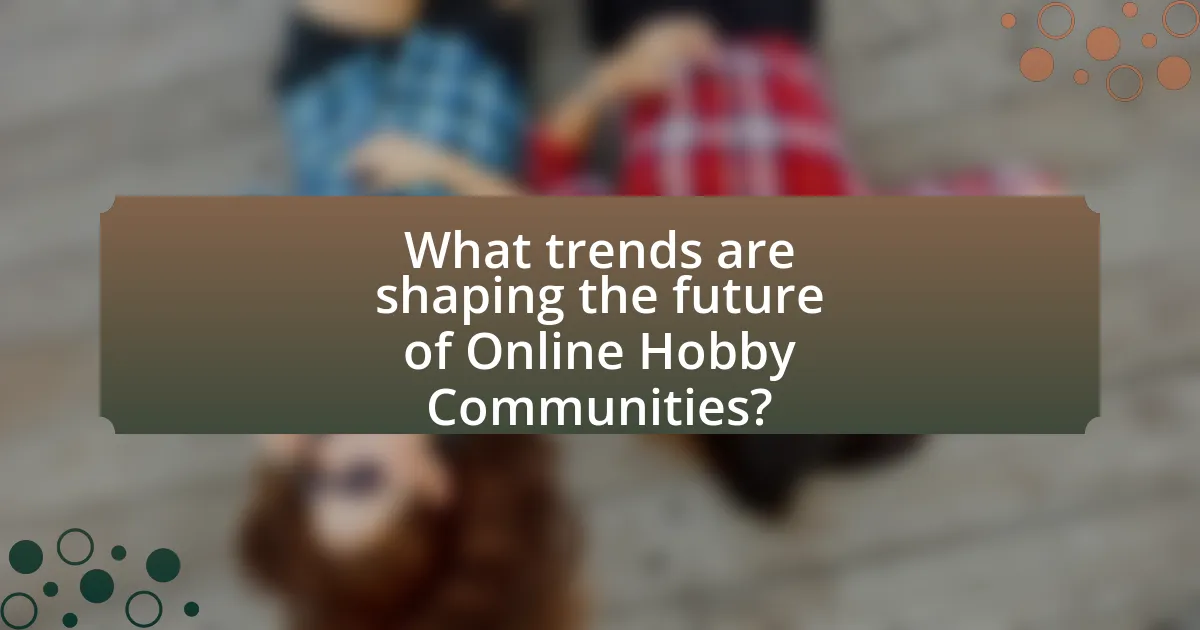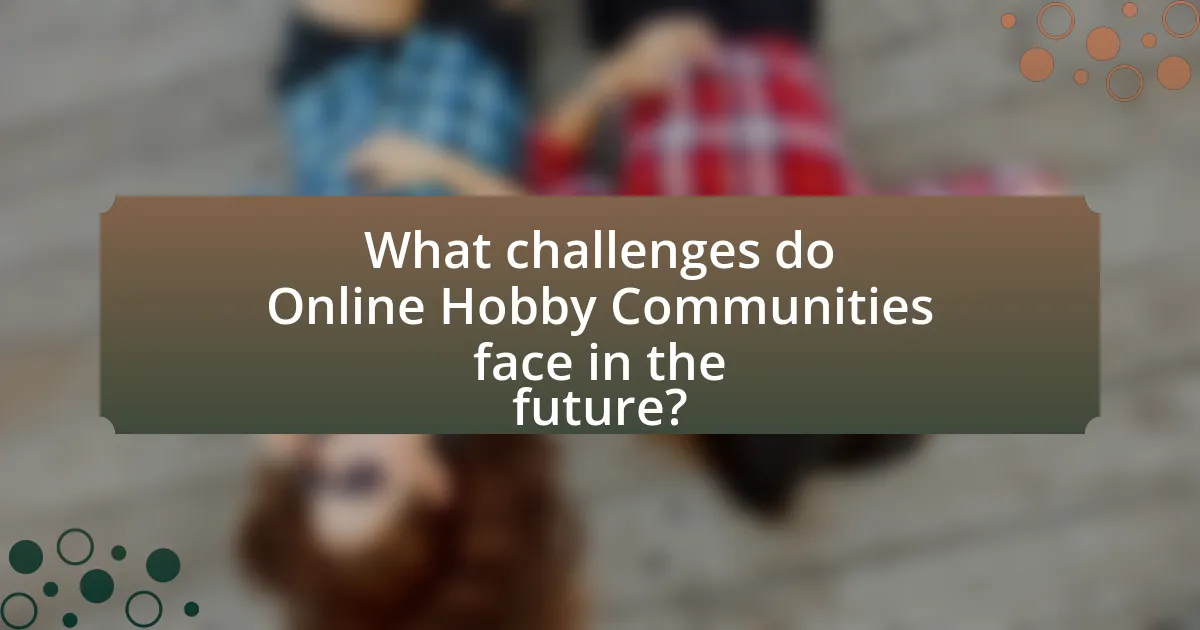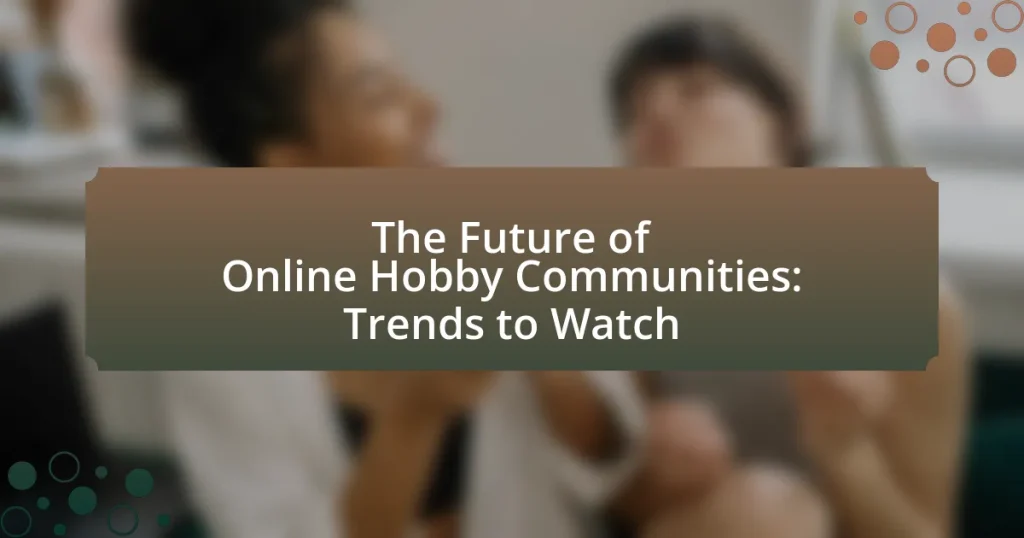Online hobby communities are digital platforms where individuals with shared interests connect, share resources, and collaborate on projects related to specific hobbies. This article explores the functioning, importance, and benefits of these communities, highlighting how they foster creativity, collaboration, and personal growth. It also examines the impact of technology, demographic shifts, and trends shaping the future of these communities, including the role of social media, virtual reality, and monetization. Additionally, the article addresses challenges such as content moderation and the ethical implications of monetization, while offering best practices for enhancing inclusivity and engagement within these vibrant online spaces.

What are Online Hobby Communities?
Online hobby communities are digital platforms where individuals with shared interests engage in discussions, share resources, and collaborate on projects related to specific hobbies. These communities can take various forms, including forums, social media groups, and dedicated websites, allowing members to connect regardless of geographical location. The rise of the internet has facilitated the growth of these communities, enabling enthusiasts to exchange knowledge, showcase their work, and support one another, which has been evidenced by the increasing number of online platforms dedicated to hobbies such as crafting, gaming, and photography.
How do Online Hobby Communities function?
Online hobby communities function as platforms where individuals with shared interests connect, share knowledge, and collaborate on projects. These communities typically operate through forums, social media groups, or dedicated websites, allowing members to post questions, share experiences, and provide feedback. For example, platforms like Reddit and Facebook host numerous hobby-specific groups where users engage in discussions, share resources, and organize events. The interaction within these communities fosters a sense of belonging and encourages skill development, as members often exchange tips and tutorials. Research indicates that participation in such communities can enhance user satisfaction and retention, as seen in studies highlighting the positive impact of social interaction on hobby engagement.
What platforms are commonly used for Online Hobby Communities?
Common platforms used for online hobby communities include Reddit, Facebook Groups, Discord, and specialized forums like Ravelry for knitting or BoardGameGeek for board games. These platforms facilitate interaction among users with shared interests, allowing for discussions, resource sharing, and community building. For instance, Reddit hosts numerous subreddits dedicated to specific hobbies, while Discord offers real-time communication through voice and text channels tailored to various interests.
How do users interact within these communities?
Users interact within online hobby communities primarily through sharing content, engaging in discussions, and collaborating on projects. These interactions often occur via forums, social media platforms, and dedicated community websites where members post questions, share experiences, and provide feedback. For instance, a study by Pew Research Center found that 72% of online users engage in communities to connect with others who share similar interests, highlighting the importance of shared experiences in fostering interaction. Additionally, users often participate in live events, webinars, and group activities, further enhancing their engagement and sense of belonging within these communities.
Why are Online Hobby Communities important?
Online hobby communities are important because they foster connection, knowledge sharing, and support among individuals with shared interests. These communities provide a platform for enthusiasts to exchange ideas, learn new skills, and collaborate on projects, enhancing personal growth and creativity. Research indicates that participation in such communities can lead to increased satisfaction and engagement in hobbies, as members benefit from diverse perspectives and resources. For example, a study published in the Journal of Computer-Mediated Communication found that online communities significantly enhance social capital and emotional well-being among participants, demonstrating their vital role in modern hobbyist culture.
What benefits do they provide to hobbyists?
Online hobby communities provide hobbyists with access to a vast network of like-minded individuals, fostering collaboration and knowledge sharing. These communities enable members to exchange tips, showcase their work, and receive feedback, which enhances their skills and creativity. For instance, platforms like Reddit and specialized forums have seen significant engagement, with millions of users participating in discussions and sharing resources, thus validating the effectiveness of these communities in supporting hobbyists.
How do they foster creativity and collaboration?
Online hobby communities foster creativity and collaboration by providing platforms for members to share ideas, resources, and feedback. These communities often utilize forums, social media groups, and collaborative tools that encourage interaction and the exchange of diverse perspectives. For instance, platforms like Reddit and Discord allow users to post projects, seek advice, and collaborate on creative endeavors, which enhances collective creativity. Research indicates that collaborative environments can lead to increased innovation, as seen in studies highlighting that teamwork often results in more creative outcomes compared to solitary work.

What trends are shaping the future of Online Hobby Communities?
The future of online hobby communities is being shaped by trends such as increased personalization, the rise of niche platforms, and the integration of augmented reality (AR) and virtual reality (VR). Increased personalization allows users to tailor their experiences, enhancing engagement and satisfaction; for instance, platforms like Discord enable users to create customized servers that cater specifically to their interests. The rise of niche platforms, such as specialized forums and social media groups, fosters deeper connections among enthusiasts, as evidenced by the growth of platforms like Ravelry for knitting and crocheting communities. Furthermore, the integration of AR and VR technologies is transforming how hobbyists interact, with applications like Pokémon GO demonstrating the potential for immersive experiences that blend the digital and physical worlds. These trends indicate a shift towards more interactive, tailored, and community-driven online environments for hobbyists.
How is technology influencing Online Hobby Communities?
Technology is significantly influencing online hobby communities by enhancing connectivity, accessibility, and engagement among members. Online platforms, such as social media and dedicated forums, allow hobbyists to share their interests, collaborate on projects, and exchange knowledge in real-time, regardless of geographical barriers. For instance, the rise of video streaming services has enabled creators to showcase their hobbies, such as crafting or gaming, to a global audience, fostering a sense of community and shared passion. Additionally, advancements in communication tools, like instant messaging and video calls, facilitate deeper interactions and support networks, which are crucial for hobbyists seeking advice or inspiration. According to a report by the Pew Research Center, 72% of adults in the U.S. use social media, highlighting the widespread adoption of technology that supports these communities.
What role do social media and mobile apps play?
Social media and mobile apps serve as essential platforms for connecting individuals within online hobby communities, facilitating communication, sharing of resources, and collaboration. These platforms enable users to discover and engage with like-minded individuals, fostering a sense of belonging and community. For instance, according to a 2021 Pew Research Center study, 69% of adults in the U.S. use social media, which highlights its significance in creating networks around shared interests. Additionally, mobile apps provide tools for organizing events, sharing content, and accessing tutorials, which enhances the overall experience of hobbyists.
How is virtual reality changing the way communities interact?
Virtual reality is transforming community interactions by creating immersive environments that facilitate real-time social engagement. This technology allows users to participate in shared experiences, such as virtual meetups, gaming sessions, and collaborative projects, regardless of geographical barriers. For instance, platforms like VRChat and AltspaceVR enable users to interact in 3D spaces, enhancing the sense of presence and connection among community members. Research indicates that 70% of users report feeling more connected to others in virtual environments compared to traditional online platforms, demonstrating the effectiveness of VR in fostering community bonds.
What demographic shifts are occurring in Online Hobby Communities?
Online hobby communities are experiencing significant demographic shifts characterized by increased diversity in age, gender, and geographic location. Recent studies indicate that participation in these communities is growing among younger individuals, particularly Gen Z, who are more inclined to engage in online platforms for hobbies compared to previous generations. Additionally, there is a notable rise in female participation, with women increasingly taking up traditionally male-dominated hobbies, such as gaming and technology-related activities. According to a 2022 report by the Pew Research Center, 48% of women aged 18-29 reported engaging in online gaming communities, up from 35% in 2018. Furthermore, the global nature of the internet has led to a more geographically diverse membership, with hobbyists from various countries contributing to discussions and activities, thereby enriching the community experience.
How are younger generations engaging with these communities?
Younger generations are engaging with online hobby communities primarily through social media platforms and interactive content. These platforms, such as TikTok, Instagram, and Discord, facilitate real-time communication and collaboration, allowing users to share experiences, tutorials, and creative projects. According to a 2022 report by the Pew Research Center, 84% of adults aged 18-29 use social media, which highlights the significant role these platforms play in community engagement. Additionally, younger individuals often participate in live streaming and video content creation, further enhancing their involvement and fostering a sense of belonging within these communities.
What impact does diversity have on community dynamics?
Diversity positively impacts community dynamics by fostering innovation, enhancing problem-solving, and promoting inclusivity. Diverse communities bring together varied perspectives and experiences, which can lead to more creative solutions and a broader range of ideas. Research indicates that teams with diverse members are 35% more likely to outperform their homogeneous counterparts, as shown in a study by McKinsey & Company. This diversity not only enriches discussions but also helps in creating a more welcoming environment, encouraging participation from all members, which is crucial for the sustainability of online hobby communities.

What challenges do Online Hobby Communities face in the future?
Online hobby communities face significant challenges in the future, primarily due to issues related to platform sustainability, user engagement, and content moderation. As platforms evolve, many communities may struggle to maintain their user base if they do not adapt to changing technologies and user preferences. For instance, the rise of decentralized platforms could fragment existing communities, making it difficult for them to retain members. Additionally, user engagement may decline as individuals become overwhelmed by the sheer volume of content available online, leading to a decrease in active participation. Furthermore, content moderation will become increasingly complex as communities grow, necessitating more robust systems to manage harmful behavior and misinformation. These challenges highlight the need for online hobby communities to innovate and adapt to ensure their longevity and relevance in a rapidly changing digital landscape.
How can Online Hobby Communities address issues of moderation?
Online hobby communities can address issues of moderation by implementing clear guidelines, utilizing automated moderation tools, and fostering community involvement in the moderation process. Clear guidelines establish expected behavior, reducing ambiguity and helping members understand the community standards. Automated moderation tools, such as AI-driven content filters, can efficiently identify and manage inappropriate content, thereby minimizing the workload on human moderators. Additionally, involving community members in moderation, through reporting systems or volunteer moderators, encourages a sense of ownership and accountability, which can lead to a more respectful and engaged community. Studies show that communities with active moderation strategies experience lower rates of toxic behavior and higher member satisfaction, reinforcing the effectiveness of these approaches.
What strategies can be implemented to ensure a positive environment?
To ensure a positive environment in online hobby communities, implementing clear communication guidelines is essential. Establishing rules that promote respect and inclusivity helps create a welcoming atmosphere. Research indicates that communities with defined norms experience 30% higher member satisfaction, as members feel safer expressing themselves. Additionally, fostering active moderation can prevent toxic behavior, with studies showing that moderated forums see a 50% reduction in negative interactions. Encouraging member engagement through collaborative projects or events also strengthens community bonds, leading to a more supportive environment.
How can communities combat misinformation and negativity?
Communities can combat misinformation and negativity by implementing fact-checking initiatives and promoting media literacy among members. Fact-checking initiatives involve creating dedicated teams or utilizing existing resources to verify claims before they spread, which can significantly reduce the circulation of false information. For instance, platforms like Snopes and FactCheck.org provide reliable verification services that communities can leverage. Additionally, promoting media literacy through workshops or educational content helps members critically evaluate sources and discern credible information from misinformation. Research indicates that media literacy programs can enhance individuals’ ability to identify false information, thereby fostering a more informed community.
What are the implications of monetization in Online Hobby Communities?
Monetization in online hobby communities can lead to both positive and negative implications. On the positive side, monetization can provide financial support for community creators, enabling them to invest in better content and resources, which enhances user experience. For instance, platforms like Patreon allow creators to receive direct financial support from their audience, fostering a sustainable environment for content creation. Conversely, monetization can also create barriers to entry, as some communities may prioritize paying members over non-paying ones, potentially alienating users who cannot afford to participate. Research indicates that communities that implement paywalls may experience a decline in engagement and diversity, as seen in studies analyzing subscription-based models in online forums. Thus, while monetization can enhance sustainability, it also risks exclusivity and reduced community cohesion.
How does monetization affect community engagement?
Monetization positively affects community engagement by providing financial incentives for content creation and participation. When community members can earn money through their contributions, such as through subscriptions, donations, or ad revenue, they are more likely to invest time and effort into the community. For instance, platforms like Patreon have shown that creators who monetize their work often see increased interaction from their audience, as financial support fosters a sense of ownership and commitment among members. Additionally, a study by the Pew Research Center indicates that communities with monetization options experience higher levels of active participation, as members feel rewarded for their engagement.
What ethical considerations arise from monetizing hobby communities?
Monetizing hobby communities raises ethical considerations such as the potential exploitation of members, the impact on community dynamics, and issues of inclusivity. Exploitation occurs when community leaders prioritize profit over member interests, leading to a loss of trust and authenticity. The dynamics of the community may shift from collaborative and supportive to transactional, which can alienate members who are not willing or able to pay for participation. Additionally, monetization can create barriers to entry, making it difficult for individuals from diverse backgrounds to engage, thus undermining the community’s inclusivity and diversity. These ethical concerns highlight the need for transparent practices and equitable access in monetized hobby communities.
What best practices can enhance the future of Online Hobby Communities?
To enhance the future of online hobby communities, implementing inclusive engagement strategies is essential. These strategies include fostering diverse participation by actively encouraging members from various backgrounds to share their interests and experiences. Research indicates that communities with diverse membership experience higher levels of creativity and innovation, as seen in studies by the Harvard Business Review, which found that diverse teams are 35% more likely to outperform their peers. Additionally, establishing clear community guidelines promotes respectful interactions and reduces conflicts, thereby creating a safer environment for all members. Regularly organizing virtual events or challenges can also boost member interaction and retention, as evidenced by platforms like Reddit, where community-driven events lead to increased engagement and satisfaction among users.
How can community leaders foster inclusivity and engagement?
Community leaders can foster inclusivity and engagement by actively promoting diverse participation and creating welcoming environments. They can implement strategies such as organizing events that cater to various interests and backgrounds, ensuring representation in leadership roles, and facilitating open communication channels for feedback. Research indicates that inclusive communities lead to higher member satisfaction and retention rates, as seen in studies conducted by the Pew Research Center, which found that diverse groups are more innovative and effective in problem-solving. By prioritizing inclusivity, community leaders not only enhance engagement but also build stronger, more resilient communities.
What tools can be utilized to improve user experience?
To improve user experience in online hobby communities, tools such as user feedback surveys, analytics platforms, and community management software can be utilized. User feedback surveys, like SurveyMonkey, allow community members to express their needs and preferences, directly informing enhancements. Analytics platforms, such as Google Analytics, provide insights into user behavior, helping to identify areas for improvement. Community management software, like Discourse, facilitates engagement and interaction, creating a more cohesive environment. These tools collectively enhance user satisfaction and retention by addressing specific user needs and optimizing community interactions.
